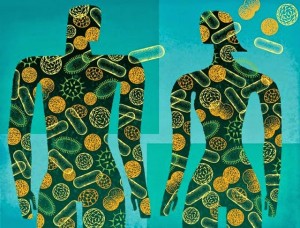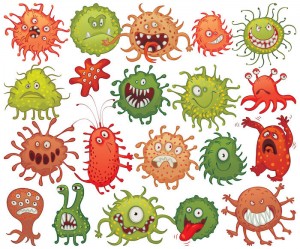Microbiome research has not yet reshaped our conceptions of mental health etiology and treatment (see my previous article), but it should be causing havoc in the social sciences – particularly for anthropologists, who have long sought to understand cross-cultural conceptions of the ‘individual’ and ‘relatedness’.

The intertwined roles of microbial and human genes in human functionality provide the basis for reconceptualising ‘human beings’ to include their microbiomes. Doing so involves a departure from the conventional single-genome/single-organism conception of the ‘human being’, towards a definition of ‘human beings’ as an amalgam of diverse entities, and diverse genomes.
We might extend this thinking to ask how the microbiome may interact with our perception of relatedness. The heritability of the microbiome is contentious (1), but social factors like diet probably largely explain why members of the same household share microbiomal genes. In our Euro-American system, the sharing of biogenetic substance (DNA and blood) constitutes kinship. Recent microbiology has observed that a microbiome is established throughout life. Social behaviours, such as eating together and living together over time, are important factors in shaping the composition of a microbiome; families that live in the same household have more similar microbiomes compared to the rest of a population. The microbiological evidence seems, therefore, to show that the biogenetic relationship between human beings could be re-cast as fluid and acquired.
“departure from the conventional single-genome/single-organism conception of the ‘human being’, towards a definition of ‘human beings’ as an amalgam of diverse entities, and diverse genomes”
Perhaps Euro-American scientific understandings of human genetics are now in line with other systems of knowledge, whereby kinship ties are formed through the sharing of substances beyond inherited DNA. For example, among the Nuer of southern Sudan, ‘blood relatedness is created through the sharing of food’, and among Malays in Pulau Langkawi, kinship is not fixed but a ‘process of becoming’ shaped by feeding (2).
“… kinship ties are formed through the sharing of substances beyond inherited DNA”
Going forward, behavioural genetic and biomedical research should investigate the environmental and genetic factors that shape the microbiome across time; what effects the bacterial composition has on functioning; and perhaps also consider the relevance of anthropological reconceptualisations of traditional boundaries – such as those between human and non-human, and between family and people who also eat at the King’s College London SGDP cafe!

Individuals who eat and live together can have microbiomes that are more genetically similar. Does this change these individuals’ relatedness?
Bibliography
- (1) van Opstal EJ, Bordenstein SR. MICROBIOME. Rethinking heritability of the microbiome. Science. 2015 Sep 11;349(6253):1172–3.
- (2) Carsten. Cultures of Relatedness: New Approaches to the Study of Kinship [Internet]. Cambridge University Press; 2008. Available from: https://www.amazon.co.uk/Cultures-Relatedness-Approaches-Study-Kinship/dp/0521656273

